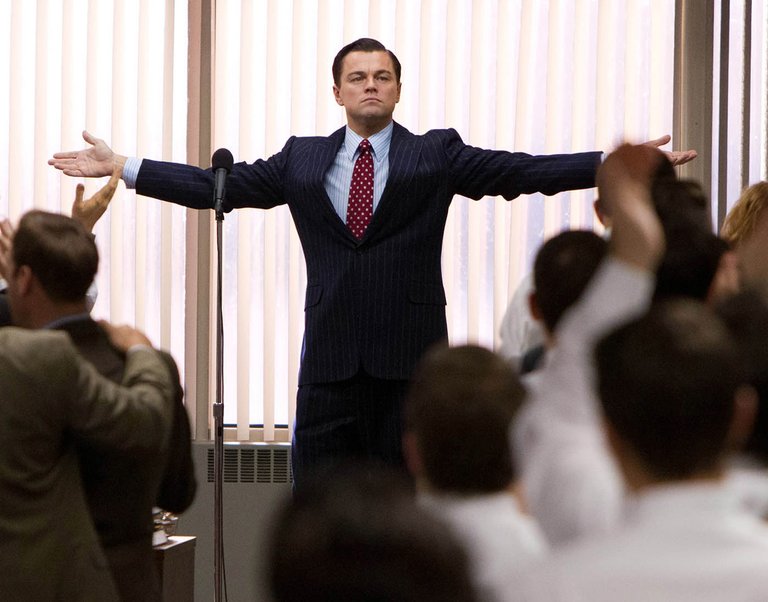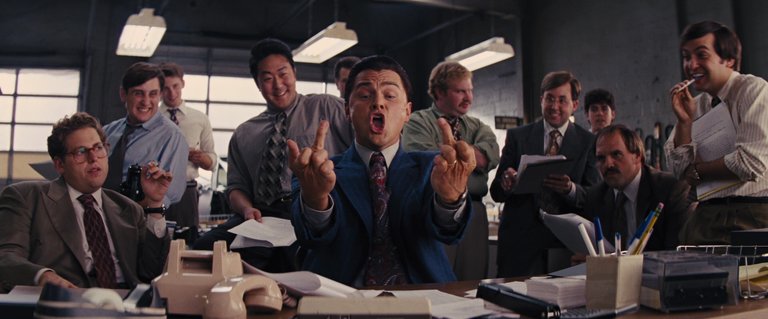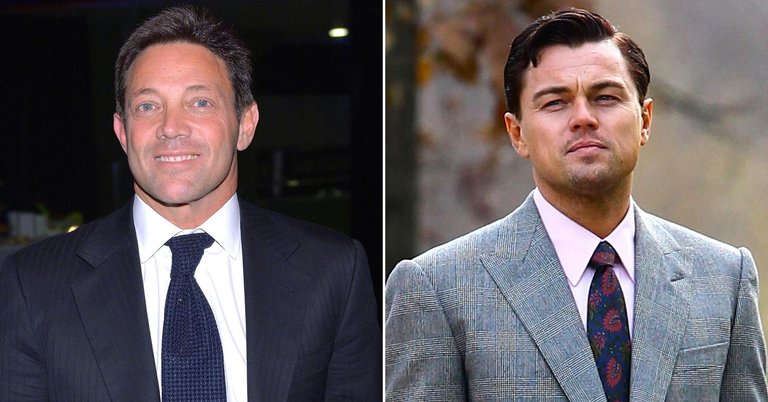JORDAN BELFORT:
The Man You Love To Hate
"My name is Jordan Belfort. The year I turned 26, I made 49 million dollars, which really pissed me off because it was three shy of a million a week" (IMBD, Wolf Quotes).
I believe that people like to live their lives vicariously through villains, especially if they are good looking, charismatic, and rich. We want what they have, but would never admit to. We are drawn to the dark side of human behavior and the dark glamour of villains as long as they are not completely repulsive, are multifaceted and we can understand where they are coming from. Somehow, we tend to give them the benefit of the doubt. Why else would we secretly cheer for them in books and movies?
 (daily beast).
(daily beast).
By exploring The Wolf of Wall Street, and despite the knowledge that Jordan Belfort was a real-life crook, (who cheated investors with fraudulent share sales), it's difficult to hate a villain who thinks he's a good guy.
There is something about the Martin Scorsese film The Wolf of Wall Street that makes me want to root for the dark side. It tells a rags-to-riches story that quickly becomes a cavalcade of greed, wrath, lust and pretty much all seven deadly sins. Although, it mostly glorifies the idea of becoming richer and more powerful, the movie I believe is a cautionary tale depicting the problems of a larger cultural concern; the promise of instant gratification by indulging in bad but thrilling behavior and getting away with it by promising redemption in the end.
I feel that Jordan Belfort fits into Nietzsche's concept of the false good vs. evil paradigm. As Heit explains in No Laughing Matter, this concept is described as, a belief by someone that what they are saying or doing is for the greater good, even if it is not.
(Nietzschean, Laughing Matter, 175).
When he first begins his career on Wall Street, Belfort is a poor but enthusiastic young broker, eager to gain the best clients and do well in the business. During a luncheon with his boss and mentor, the conversation revolves around the primary goal as a stockbroker. His boss reveals that the only responsibility Belfort has is to put "meat on the table," and to do so you must "move the money from your client's pocket into your pocket". Belfort (still being new and innocent in the business) responds by saying, "but if you make the clients a profits as well as yourself, it's advantageous for both, correct."(IMBD, Wolf Quotes).
Clearly at this point in his career, Belfort still has the attitude where it's ideal for everyone to engage in a "win, win" situation.

(bizfund, 10 lessons).
It isn't until Black Monday and the stock market crash when Belfort is without a job that he discovers a fascinating and lucrative way to make mega dollars in penny stocks. Who can refuse a "get rich quick scheme" when you're down and out? He literally takes his old boss' advice and sticks it to the establishment, and unfortunately other investors who placed their lifesavings in his hands. He learns that by selling garbage to schmucks, he can build a company and make himself and all of his hard-working employees very rich. He learns that he has an uncanny ability to recruit, and teach (pretty much anyone without any brokerage experience), to pressure-sell worthless shares, by talking up the value of the shares. Then sell the shares for profit while the investors experience losses when the inflated share prices collapse.
Those of us watching this unfold, know what he is doing is horrible, but we rally behind him because we feel he is only a small part of the underground of an even worse manipulation of the financial sector. As a reviewer stated on IMBD, "it's all broken so why not at least get rich yourself". (IMBD reviews) Belfort is merely the poor guy who stuck it to the bankers, so it's weirdly okay.
As his success multiplied, Belfort allowed himself to get carried away by the excess in his life. He became the "evil" in the "false good vs. evil paradigm". He knows the ramifications of his actions, but doesn't care. He cares only to become rich and powerful, and he feels justified by also giving his employees that opportunity. He preaches his philosophy to his employees and motivates them into thinking and feeling exactly how he feels, because they want what he has. His motivational speech on how there is "no nobility in poverty", and "you can deal with your problems by becoming rich", excites the employees into a fierce and relentless buying and selling frenzy (IMBD, Wolf Quotes). This is a "win-win" situation for both in his mind. As the viewer, one is also drawn into his boldness and exuberance, and like his employees, somehow you are on his side; even though deep down you know this can't end well.
Of course, it doesn't. But not before it gets much worse. The concept of the, cool villain vs. the uncool villain, in Forbes' Aesthetic of Evil, clearly Belfort remains in the "cool". Even with all the hedonistic excess, of massive parties, drugs, and prostitution, we are revolted and enchanted at the same time; yet he isn't so completely repellent that we are unable to identify with him. We don't find his actions pathetic so that they represent deep moral cowardice as Forbes suggests that an uncool villain possesses. (Heit, Forbes: Not Cool, 20). In fact, it is just the opposite. According to Nietzsche, "morality is cowardice". (Peterson) A cool person would be willing to go out and face rejection; an uncool person would not. Lecturer Jordan Peterson states what Nietzsche means is, "that most of what people claim to be moral virtue, is merely their fear to do anything that they would actually like to do that society would deem inappropriate. Has nothing to do with morality whatsoever."(Peterson) This appears to be true with Belfort. He doesn't give a hoot about being virtuous, and clearly has no fear when it comes to doing inappropriate things. That's what makes him cool, even when he is drooling on the floor, and strung out on Quaaludes. (Heit, Forbes: Not Cool, 20-23).
Likewise, Belfort fits the concept of the villain who is intriguing vs. the villain who is horrifying. Without Belfort's motivational sales scenes, his scheming and lying and his bad but thrilling behavior, we wouldn't be allowed to feel what it's like to be one of those guys, and we are intrigued. As a villain, Belfort is appealing and without him, the movie would be meaningless. It's in his character too. He is different. He is endearing. No matter what he does, he somehow seems to make some part of you want to see more. He exists for a reason. He is a real person, not just a one-dimensional character, and we think of him as who he is, what he did, and what he stands for. Heit, Forbes: Intriguing/Horrifying, 20-23).

(manners magazine).
Conversely, Belfort is not a horrifying villain. Regardless of his amoral and revolting behavior, suffice it to say that he should never be put in the same boat alongside truly evil and horrifying villains that have no respect for human life and dignity. One might think of Hannibal Lector or a Jeffrey Dahmer, or Scarface in this case. Belfort hasn't murdered or raped anyone. He hasn't physically robbed any banks or destroyed anyone's property, so he is still pretty cool, isn't he? I think so! I believe Belfort is merely a human being who knew that what he was doing was wrong, yet his vision was clouded because of his serious drug habit. It was his way of coping with the stress. It can happen to anyone of us without becoming truly evil and soulless. It's easy to get caught up in the grab for success, money and status, and because we often glorify bad guys as heroes and role models for achieving financial success, we determine they are only human and there is still hope for redemption.
Villains are especially exciting when they offer up redemptive qualities, which make us love them even more. I feel the larger cultural concern is that of instant gratification fueled by an addiction causing a downward spiral. This addiction can be drugs, money, power, or any number of things and in Belfort's case after he hit rock bottom, and was arrested and convicted, he realized that he had the talent to motivate people and decided to transform himself into a motivational speaker. Even during his public speech where he confesses to what he did wrong, one can see in the audience is still enamored by him. What did Jordan Belfort instill in his employees? Was it hope, greed, or awe? Probably what many of us thought watching the film. Not disdain or disgust, but awe. (Why we like a villain, Bowler).
Every guy wants to be Jordan Belfort. They want to be the Alpha Male and have exactly the same dreams as all the people in the movie wanted. It's not about Wall Street. The real problem is with us, the ordinary people who want to emulate Jordan instead of rejecting him (Revolting & Great, Vanity Fair). Many of us we will overlook all kinds of outrageous behavior as long as we get a chance to make big money and make it as quickly as possible. People get sucked into scams every day of the week by other Belfort's of this world. I believe that to be the larger cultural concern and the essence of what the movie was trying to emphasize. Jordan Belfort in his own words acknowledges his actions:
"You know there are lots of different paths to find happiness in your life, and money for me was never going to be an issue because I know the rules of being an entrepreneur. The issue was: What was I going to do? And I was determined to do whatever I was going to do absolutely legitimately, with the highest level of ethics and integrity -- and that takes longer. I had a fundamental shift in values when I was in prison. So I made a conscious decision: "I'm going to become a speaker." I wrote out a vision statement: One day, I'm going to be speaking to 10,000 people. Then I started making a lot of money." (Galloway)
(Hollywood Reporter, Jordan Belfort).

(CNBC, Rock botton).
Works Cited
Bowler, Tim. "The Wolf of Wall Street: Why We like a Villain." BBC News, BBC, 10 Jan. 2014, www.bbc.com/news/business-25651792.
Rich, Katey. "Why the Wolf of Wall Street Is Amoral, Revolting, And Great." The Hive, Vanity Fair, 30 Jan. 2015, www.vanityfair.com/hollywood/2013/12/why-the-wolf-of-wall-street-is-amoral-revolting-and-great.
Baldwin, Thomas. "The Wolf of Wall Street: Hero or Villain?" Patriot Pages, 22 May 2018, bjhspatriotpages.com/opinion/2014/01/17/the-wolf-of-wall-street-hero-or-villain/.
Belfort, Jordan, and Stephen Galloway. "Real-Life 'Wolf of Wall Street': 'It Was Awful What I Did, But I Was on Massive Amounts of Drugs'." The Hollywood Reporter, The Hollywood Reporter, 27 Feb. 2014, www.hollywoodreporter.com/news/wolf-wall-street-jordan-belfort-682968.
"User Reviews." IMDb, IMDb.com, 22 May 2018, www.imdb.com/title/tt0993846/reviews.
"'Morality Is Cowardice." Nietzsche, Peterson, Krauser & Daygame." Days of Game, 26 Apr. 2017, www.daysofgame.com/theory/morality-cowardice-nietzsche-peterson-krauser-daygame/.
"Quotes." IMDb, IMDb.com, 22 May 2018, www.imdb.com/title/tt0993846/quotes/?tab=qt&ref_=tt_trv_qu.
Heit, Jamey. Vader, Voldemort and Other Villains: Essays on Evil in Popular Media. Mcfarland & Co Inc, 2011. Daniel A. Forbes Aesthetic of Evil
Heit, Jamey. Vader, Voldemort and Other Villains: Essays on Evil in Popular Media. Mcfarland & Co Inc, 2011. Jamey Heit No Laughing Matter: The Joker as a Nietzschean Critique of Morality
So, Jimmy. "The Real Wolf of Wall Street: Jordan Belfort's Vulgar Memoirs." The Daily Beast, The Daily Beast Company, 20 Dec. 2013, www.thedailybeast.com/the-real-wolf-of-wall-street-jordan-belforts-vulgar-memoirs.
"10 Business Lessons from The Wolf of Wall Street." Biz Fund, 12 Dec. 2017, bizfund.com/10-business-lessons-from-the-wolf-of-wall-street-2/.
Umoh, Ruth. "Real 'Wolf of Wall Street' Shares 3 Secrets to Achieving Success after You Hit Rock Bottom." CNBC, CNBC, 27 Feb. 2018, www.cnbc.com/2018/02/27/jordan-belfort-reveals-3-secrets-to-success-after-hitting-rock-bottom.html.
Person. "Vuurwerk Op De Beurs Bij AkzoNobel, Maar Wat Is Een Vijandige Overname Eigenlijk?" Manners Magazine, Manners Magazine, 12 May 2017, www.manners.nl/akzonobel-vijandige-overname/.